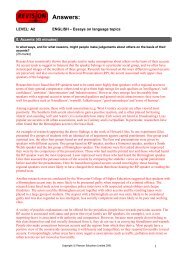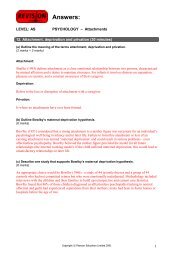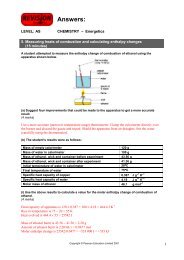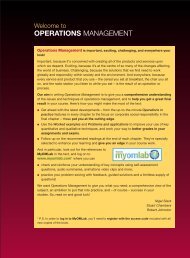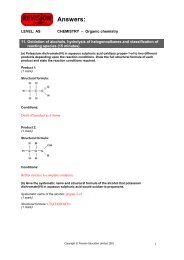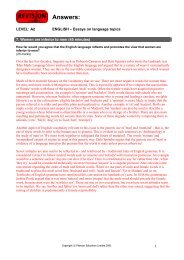The Dove Campaign for Real Beauty - Pearson
The Dove Campaign for Real Beauty - Pearson
The Dove Campaign for Real Beauty - Pearson
You also want an ePaper? Increase the reach of your titles
YUMPU automatically turns print PDFs into web optimized ePapers that Google loves.
Part 1 Marketing nowA way must be found to restore a balance between private and public goods. One option isto make producers bear the full social costs of their operations. Governments are also requiringcar manufacturers to build cars with even more safety features and better fuel efficiency. <strong>The</strong>European Commission’s end-of-life vehicles (ELV) directive already makes manufacturerspay <strong>for</strong> the cost of scrapping the cars they make. Car makers raise their prices to cover extracosts. If buyers found the price of some cars too high, however, the production woulddecline, and demand would move to those producers that could support both the privateand social costs.A second option is to make consumers pay the social costs. For example, highway authoritiesaround the world are starting to charge ‘congestion charges’ in an ef<strong>for</strong>t to reduce trafficcongestion.Countries such as Norway, the UK, France, Singapore and the US are managing traffic withvarying tolls. For example, to unclog its streets, the city of London now levies a congestioncharge of £10 (€15) per day per car to drive in an eight-square-mile area downtown. <strong>The</strong>charge has not only reduced traffic congestion by 30 per cent, it raises money to fund London’spublic transportation system. In southern Cali<strong>for</strong>nia drivers are being charged premiums totravel in under-used car pool lanes. For example, San Diego has turned some of its HOV(high-occupancy vehicle) lanes into HOT (high-occupancy toll) lanes <strong>for</strong> drivers carrying toofew passengers. Regular drivers can use the HOV lanes, but they must pay tolls ranging from$0.50 (€0.37) off-peak to $4.00 (€3) during rush hour. Peak surcharges are being studied <strong>for</strong>roads around other American cities. Economists point out that traffic jams are caused whendrivers are not charged the costs they impose on others, such as delays. If the costs ofdriving rise high enough, consumers will travel at non-peak times or find alternativetransportation modes. In Singapore, drivers are charged <strong>for</strong> every move they make in thecity state’s central business district and the licence to buy a car on taxes makes the cost ofcar ownership several times European levels, yet people still drive classy Mercedes. ‘Make’em pay’ is part of making car drivers pay their full social cost but, whatever the price, peopledrive on. 18Cultural pollutionCritics charge the marketing system with creating cultural pollution. Our senses are assaultedconstantly by advertising. Commercials interrupt serious programmes; pages of ads obscureprinted matter; billboards mar beautiful scenery; spam fills our e-mail inboxes. <strong>The</strong>se interruptionscontinuously pollute people’s minds with messages of materialism, sex, power or status.Children’s constant exposure to advertising, the protectionists argue, creates mercenary kids,experts in ‘pester power’, who <strong>for</strong>ce their downtrodden and beleaguered parents into spendingenormous sums of money on branded goods and the latest crazes. Although not everyone mayfind advertising overly annoying (some even think it is the best part of television programming),a recent study noted that 65 per cent of consumers feel bombarded with too many marketingmessages, and some critics call <strong>for</strong> sweeping changes. 19Marketers answer the charges of ‘commercial noise’ with these arguments. First, they hopethat their ads reach primarily the target audience. But because of mass-communication channels,some ads are bound to reach people who have no interest in the product and are there<strong>for</strong>e bored82



